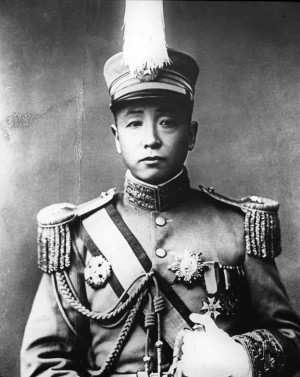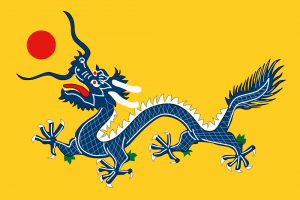Zhang Zuolin was perhaps the last warrior of the Chinese Qing Dynasty, but one might also call him a petty warlord who represented the final violent gasp of a forgotten era. He was born into poverty but rose to a position of considerable and significant power in China, although he was ultimately doomed by the larger forces of history.
Born into Obscure Poverty
Zhang Zuolin was born in 1875 to peasant parents in China’s Haicheng County. He was a thin child with the nickname of “Pimple” and he remained smaller than average throughout his life. Zhang probably received no formal education and his only skills were working with animals, especially horses. He worked in a stable and developed some minor skills in treating sick or wounded animals.
Zhang chose the life of a semi-outlaw as his pathway out of a lowly existence of obscurity. By the late 1800s, the centuries-old Qing Dynasty was crumbling. China had become a vast land of fragmented loose kingdoms and nation states. Bands of roving “bandit-gangs” roamed freely in the Chinese countryside and lived on what they could plunder. Before he was 20, Zhang joined one of these bandit-gangs. This began his eventual rise to his status of local warlord and later as a supreme ruler over the land of Manchuria.
It should be noted that the region once known as Manchuria can perhaps only be loosely defined as a discrete nation. It was a vast region of northeast China (and part of what is now Russia) long-dominated by a group of people called the Manchus.
Zhang’s Power Grows
The life of a roving bandit was something that clearly suited Zhang Zuolin. He developed the popular reputation of a Chinese Robin Hood and eventually commanded a considerable force of men who were loyal to his leadership. As the leader of a well-armed militia group, Zhang was able to hire out his forces as mercenaries and provide local protection to foreign travelers and other interests. This increased his importance as “a man to know.”
After the Boxer Rebellion broke out in 1900, Zhang allowed his personal army to fight with the Imperial Army. He also “rented” his soldiers to other interests, especially the growing imperial powers of the Japanese.
The Chaos of Revolution
In 1911, many major events happened in China. This is the year which historians generally agree that the old Qing Dynasty was finally overthrown and the beginnings of the new, more modern Republic of China begin, although many years of strife and fragmentation were still ahead. But the establishment of a new kind of government for greater China also spelled opportunity for Zhang Zuolin. That’s because he was arguably now the most powerful figure in Manchuria, and thus many would appeal to his status and position in Manchuria. Whoever wanted to prevail as the leader of the new Republic of China would need Zhang to deliver the interests of Manchuria.
Zhang was an expert in establishing order. He would put down rebellions and police any given territory to prevent it from devolving into chaos, factional fighting and lawlessness. Through his work in stabilizing Manchuria, he evolved from roving bandit and local warlord to legitimate official of a semi-recognized government. He was named “lieutenant general” of Manchurian forces by the powerful Yuan Shikai, the primary opponent of Sun Yat-Sen. The latter was the primary force behind the Chinese revolution and perhaps the nominal leader of the new Republic of China.
Zhang Zuolin acted basically as a powerful henchman for Yuan Shikai, an opponent of Sun Yat-Sen. Yuan purchased Zhang’s loyalty by supplying him with a huge amount of military aide and also personal wealth. Zhang is said to have carried out numerous political assassinations for Yuan, removing many obstacles to Yuan’s ambition to become the supreme ruler of China.
Visions of a Lasting Qing Dynasty
One thing to keep in mind about Zhang Zuolin is that he was an undying supporter of the old Qing Dynasty. It was Zhang’s vision and conviction that the Qing Dynasty was still the legitimate power of the Chinese people, and that it should rule all of China, as it has done since the 1600s. He was also fiercely anti-communist and more of a traditionalist.
This is part of the reason that Zhang supported Yuan Shikai over Sun Yat-Sen. The former was committed to establishing himself as “Emperor” of the Qing Dynasty, while Sun Yat-Sen was determined to sweep away the ancient ways and establish a more modern government in the form of the Republic of China.
Yuan Shikai eventually prevailed over Sun Yat-Sen, who fled in 1913, although Yuan’s success was extremely brief. While he was able to nominally re-establish the Qing Empire with himself seated as Emperor, he never solidified power during his rule and all of it quickly crumbled. He died in 1916 of a kidney problem and the Qing Dynasty died with him.
Zhang Maintains Manchurian Power
Where did Yuan’s death and the crumbled Qing Dynasty leave Zhang Zuolin? The death of Yuan Shikai had little effect on Zhang’s position of power in Manchuria. In 1920, Zhang was in his mid-40s and was supreme ruler of his land. The new central government of the Republic of China recognized Zhang’s military strengths and political skills. He was named “Governor-General” of Manchuria. This enabled Zhang to enjoy all the trappings of power and wealth. He maintained five wives, built a magnificent home, and had millions of dollars (yuan) in the bank.
The Beginning of the End
Manchuria also thrived economically under Zhang’s rule and performed much better the rest of China. However, the majority of the tremendous economic boom engineered by Zhang’s ministers of state was poured into the military — crippling the greater economy. In 1920, Zhang commanded a powerful force of 100,000 men known as the Fengtian Army, which eventually became a force of more than 300,000.
Zhang continued to invade his neighbors as he sought to expand the range and territories of Manchuria. While he was nominally only a governor under the umbrella of the greater Chinese Republic, Zhang’s Manchuria was essentially a powerful country beholden only to itself, and frequently out of control. Zhang himself did not necessarily recognize the legitimacy of the government of the Republic of China centered in Beijing — however, Zhang and his Fengtian Army were eventually defeated by the Nationalist Kuomintang army commanded by Chiang Kai-shek in May 1928.
Zhang Zuolin was assassinated in 1928 by the Japanese. Although they supported him for many years, they lost faith in him after his failure to defeat the Chinese Nationalists. His death came about as the result of a bomb planted in a railroad car in which Zhang was traveling on his way to Shenyang. He was 53 years old.


